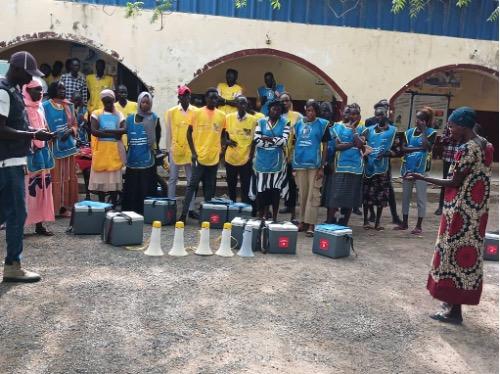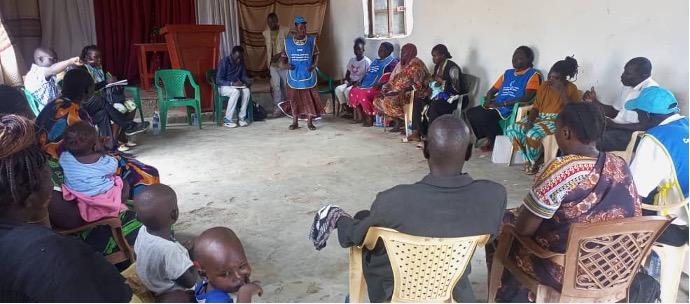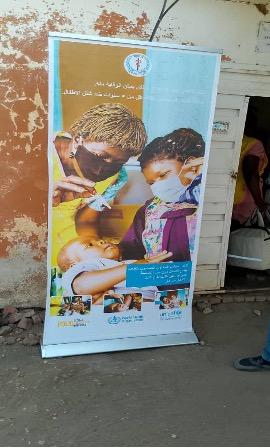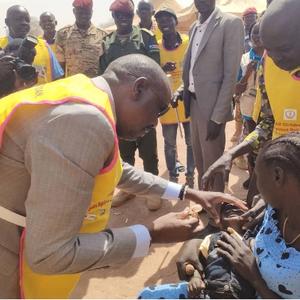South Sudan Polio Misinformation Strategies
Summary
This article discusses community-based strategies for managing polio misinformation in South Sudan, highlighting the challenges, strategies, and results of these efforts.
Community-Based Strategies for Managing Polio Misinformation in South Sudan
In the heart of South Sudan, amidst ongoing health challenges, lies a formidable effort to eradicate polio, revitalized by innovative community engagement strategies. The Integrated Community Mobiliser Network (ICMN), backed by UNICEF's Social Behavior Change initiatives, has played a pivotal role in achieving remarkable vaccination coverage rates above 95%. This network of over 1,500 community mobilizers is not just about promoting health; it embodies a transformative approach to countering misinformation and fostering community ownership in some of the most remote areas of the country.
Background
South Sudan polio eradication programme has achieved significant progress in recent years, thanks to renewed government commitment and revitalized community ownership, polio vaccination coverage has been predominantly high above 95%. One of the major reasons behind this high coverage is the deployment of Integrated Community Mobiliser Network (ICMN). A network of more than 1,500 community mobilisers trained and deployed through UNICEF Social Behavior Change support, mobilizes communities by spearheading civil society participation; and works at Payam and Boma levels. Social mobilization has evolved into an accelerated approach for achieving results with principles of mobilization at its core. The ICMN targets resistance to polio immunization through a multipronged approach by using local religious leaders, community influencers, interpersonal communication, counseling, mothers meetings, social listening announcements from religious institutions and schools. The success of the ICMN has been its ability to identify and convert resistant families into advocates for polio immunization. Deeply respected in the community, the ICMN mobilizers (30 percent of whom are women) are themselves models for gender empowerment.
The Challenge of Misinformation During Polio Vaccination Campaigns
Between March and April 2024, South Sudan undertook two critical rounds of the Polio Supplementary Immunization Activity (SIA), targeting children under five with the NOPV2 vaccine. However, the rollout faced significant obstacles due to misinformation, especially in Lakes State. Rumors began circulating following unverified reports of a vaccine-related death in Cueibet County, sparking widespread fear and confusion among the population.
This misinformation quickly took root, with alarming claims that the NOPV2 vaccine was part of a malicious agenda to harm children and reduce the population. These claims suggested without evidence that the new vaccine was responsible for weakening immune systems and triggering a resurgence of the poliovirus. Such rumors not only spread fear but also reinforced pre-existing doubts about vaccine safety, particularly among certain religious communities.

The spread of these unfounded assertions led to a severe backlash against the vaccination campaign, drastically affecting the community's trust and participation. Misguided fears propagated the belief that vaccines were tools used by wealthy nations to exert global control and deliberately harm less developed countries. This profound mistrust hindered the initial efforts of the SIA, showcasing the critical need for robust strategies to manage misinformation and restore public confidence in vital health interventions.
Social Behavior Change Implemented

A network of 105 ICMN members was trained and deployed through UNICEF Social Behavior Change framework. These mobilizers were tasked with continuously monitoring on-ground vaccine perceptions and identifying sources of misinformation using a streamlined community feedback data collection tool. The ICMN employed interpersonal communication channels during extensive house-to-house visits, community meetings, and dialogues, particularly focusing on areas with high resistance such as among certain religious groups (Islamic Faith), nomadic pastoralists, and displaced populations (Internally Displaced Population, Sudan Crisis returnees and refugees).
The following strategic actions were implemented:
- Misinformation Assessment: Through eight community dialogues involving 69 participants including refugees, returnees, and religious leaders, vital discussions were initiated to debunk myths and address concerns. The community dialogue guide was adapted from the Behavior and Social Driver qualitative tool which measures thinking and feeling, social process, motivation, and practical issues. Main issues identified included lack of knowledge on the benefits of the vaccine, strong belief in religious and traditional remedies, lack of trust in vaccines, disinformation originating from rumored polio related death.
- On-ground Social Listening: The trained ICMN members were strategically deployed across the six payams and three bomas of Cueibet County to systematically gather feedback and track rumors. The subnational Risk Communication and Community Engagement (RCCE) core group, consisting of the Expanded Program of Immunization Communication Officer, UNICEF SBC Coordinator, and a representative from Immunization Partners, met regularly to analyze this data. They prioritized the most prevalent and risky rumors, developing well-researched responses.
- Surveillance Data Utilization: To effectively target and intensify outreach efforts, surveillance and supplementary immunization activity (SIA) data were used to map and identify high-risk areas. This data included case profiles, AFP (Acute Flaccid Paralysis) non-polio cases, X-marked houses, and reports of households without eligible children. Notably, areas reporting ten or more houses without eligible children under five were marked for enhanced mobilization and advocacy, focusing on ensuring comprehensive vaccination coverage.
- Community Advocacy: Community mobilizers held regular mothers' and religious meetings to promote ongoing polio immunization efforts, coordinating with churches and mosques to make timely announcements and conducting educational sessions in schools and other community settings.
- Engagement of Key Influencer Networks: ICMN engaged religious leaders, camp leaders, and community radio stations to disseminate positive information and address myths. Over 200 community influencers were actively involved in disseminating positive messages and correcting myths through community radio stations, enhancing trust and support for the polio program.
- Counseling and Mobilization Activities: ICMN members provided targeted counseling to households, particularly those previously resistant to vaccination, within their local areas. They organized weekly meetings, educational classes on polio in schools, and facilitated discussions in Mother to Mother Groups. These efforts were complemented by regular announcements in mosques and other religious venues.
Results

The rigorous training of over 105 Integrated Community Mobiliser Network (ICMN) members and their strategic engagement in misinformation management significantly enhanced polio vaccination coverage in the region, achieving an impressive rate of over 95% in both rounds of the Polio Supplementary Immunization Activity (SIA). This success was bolstered by the active participation of more than 200 key community influencers, including religious and community leaders, who were educated on the benefits of vaccines and committed to fostering trust and acceptance within their communities.
These leaders have effectively used their platforms to promote positive attitudes towards vaccines and counteract faith-related barriers and misinformation. For instance, they facilitated open dialogues about vaccines in local meetings and through 57 announcements made in churches and mosques, which played a crucial role in increasing community engagement and compliance.
Furthermore, the trained ICMN are set to extend their scope of work to gather community feedback on other vital public health interventions throughout the State, ensuring that the successful strategies implemented for polio are adapted and applied to broader health challenges. This holistic approach not only sustains the gains made in polio eradication but also strengthens the overall healthcare system in South Sudan.
Conclusions and Lessons Learned
The Integrated Community Mobiliser Network has not only been effective in combating polio in South Sudan but has also proved to be an entry point to larger social and health benefits. Central to this success is the principle of community co-option, where local individuals are empowered to drive change from within. Here are key takeaways and broader impacts of the ICMN initiative:
- Expanding Access to Hard-to-Reach Populations: The ICMN has been instrumental in reaching refugees, returnees, and nomadic pastoralists—groups traditionally challenging to access. By establishing a network of informed and socially responsible community members, the program has facilitated broader access to polio vaccines and other crucial health services, enhancing overall community health resilience.
- Elevating the Role of Religious Leaders: By integrating religious leaders into the health advocacy framework, the ICMN has expanded their influence beyond spiritual guidance to encompass public health and social welfare. This integration has also positioned these leaders as key players in dispelling myths and misinformation, thereby strengthening public health initiatives.
- Building Community Trust: The success of any public health effort, particularly vaccination programs, hinges on the trust of the community. The ICMN's community-centric approach has demonstrated that enduring change is only possible when the community is engaged and ownership is fostered from within, not imposed from the outside.
- Utilizing Evidence-Based Interventions: Leveraging research from the social sciences, the ICMN has effectively used evidence-based strategies to address and preempt damaging rumors. These efforts are supported by strong partnerships with media, health workers, and influential community networks, ensuring that accurate information prevails and vaccination benefits are maximized.


